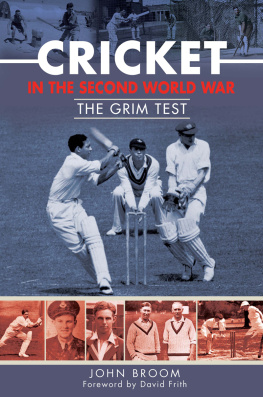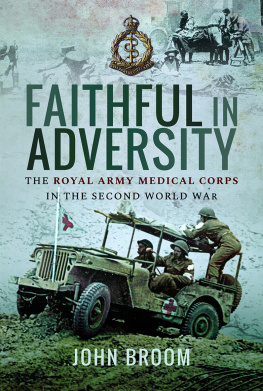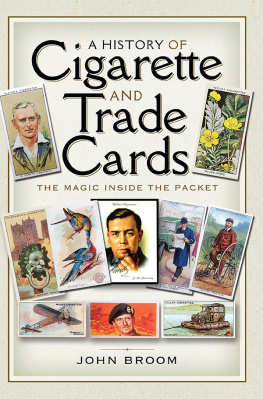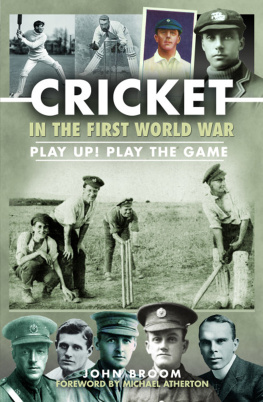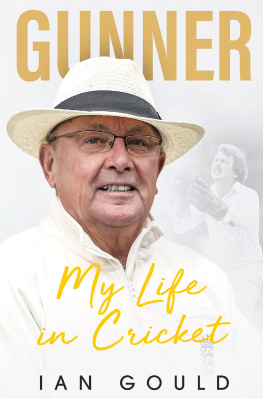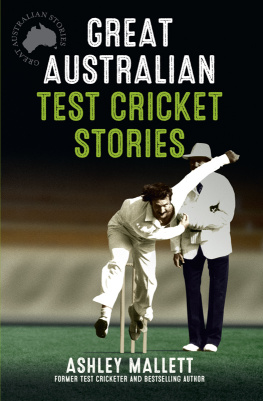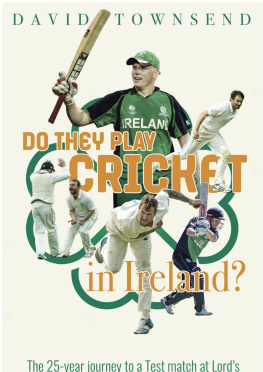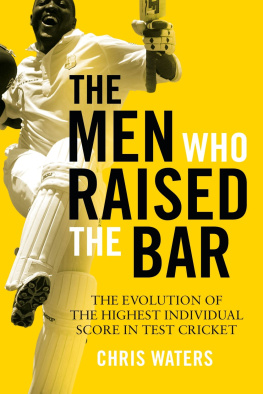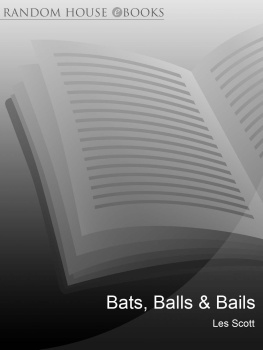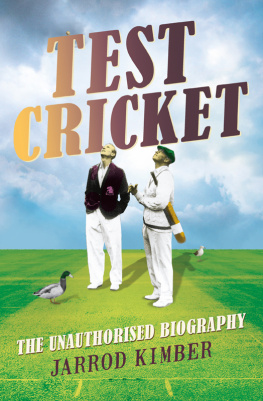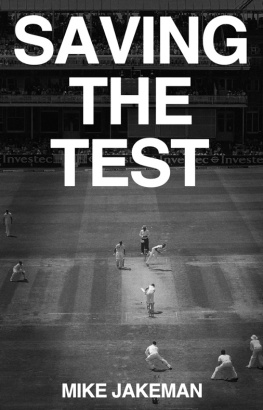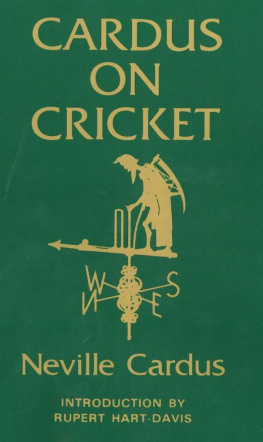Pagebreaks of the print version

Cricket in the Second World War
Other books by John Broom
Reported Missing in the Great War: 100 Years of Searching for the Truth
(Pen & Sword Military, 2020)
Faithful in Adversity: The Royal Army Medical Corps in the Second World War
(Pen & Sword Military, 2019)
Opposition to the Second World War: Conscience, Resistance & Service in Britain 193345
(Pen & Sword Military, 2018)
A History of Cigarette and Trade Cards: The Magic Inside the Packet
(Pen & Sword History, 2018)
Fight the Good Fight: Voices of Faith from the Second World War
(Pen & Sword Military, 2016)
Fight the Good Fight: Voices of Faith from the First World War
(Pen & Sword Military, 2015)
Cricket in the Second World War
The Grim Test
John Broom
First published in Great Britain in 2021 by
Pen & Sword History
An imprint of Pen & Sword Books Ltd
Yorkshire Philadelphia
Copyright John Broom 2021
ISBN 978 1 52678 017 1
eISBN 978 1 52678 018 8
Mobi ISBN 978 1 52678 019 5
The right of John Broom to be identified as Author of this work has been asserted by him in accordance with the Copyright, Designs and Patents Act 1988.
A CIP catalogue record for this book is available from the British Library.
All rights reserved. No part of this book may be reproduced or transmitted in any form or by any means, electronic or mechanical including photocopying, recording or by any information storage and retrieval system, without permission from the Publisher in writing.
Pen & Sword Books Limited incorporates the imprints of Atlas, Archaeology, Aviation, Discovery, Family History, Fiction, History, Maritime, Military, Military Classics, Politics, Select, Transport, True Crime, Air World, Frontline Publishing, Leo Cooper, Remember When, Seaforth Publishing, The Praetorian Press, Wharncliffe Local History, Wharncliffe Transport, Wharncliffe True Crime and White Owl.
For a complete list of Pen & Sword titles please contact
PEN & SWORD BOOKS LIMITED
47 Church Street, Barnsley, South Yorkshire, S70 2AS, England
E-mail:
Website: www.pen-and-sword.co.uk
Or
PEN AND SWORD BOOKS
1950 Lawrence Rd, Havertown, PA 19083, USA
E-mail:
Website: www.penandswordbooks.com
To my late parents, who inculcated a great love of the game of cricket, during visits to Hull CCs Circle Ground, trips to the Scarborough Cricket Festival and a special day out at Headingley in 1981 for a certain famous Test match. The soundtrack to my childhood seemed to be Test Match Special wireless coverage.
And to my wife and children, who I hope never live through times such as those covered in this book.
Acknowledgements
D uring the research for this project I was overwhelmed by the knowledege, generosity and sagacity of so many followers of the great game of cricket. I wish to acknowledge the contributions of the following people to the bringing to fruition of this book: Dave Allen, David Battersby, Stephen Chalke, Martin Chandler, Brian Cowley, Peter Crabtree, Allan Draycott, Martin Fiennes, Rob Franks, David Frith, Cheryl Grice, Peter Griffiths, Mike Hall, Andrew Hignell, David Jeater, Tim Jones, Steve LeMottee, Stephen Musk, Rafelle Nicholson, Jonathan Northall, Andrew Radd, John Raw, Chris Ridler, Mike Shaw, Roy Telfer, Harry Watton, Martin Williamson, James Wilson, Jack Winn, Ross Woollard.
Also to my editor Linne Matthews and the staff at Pen & Sword books for their assiduousness in assuring the timely presentation and appearance of this book.
Every reasonable effort has been made to seek copyright permissions for the images included and acknowledgements have been made where these have been known. Should I have inadvertently overlooked any copyright holders I should be happy to correct this omission in any future editions of the book.
Foreword
A nybody who lived through the Second World War, adults and children alike, now seems to belong to a separate species, largely free of the pettiness and anger and, to use one of the modern expressions, the sad and grim wokeness which burden us in this twenty-first century. Trepidation stemming from this Covid-19 pandemic has almost replicated the deep-rooted fear that afflicted us between 1939 and 1945. Many have been praying day and night for an end to this plague, just as people did in the early 1940s, when those on the battlefront and those left behind, and boys like me, all prayed nightly (and intensely) for a merciful end to that terrible war. Diversions were scarce: a couple of wireless stations, newspapers, no television, and occasional cricket matches (some at our local park in Rayners Lane). Guided by my mother, I prayed as I knelt by my bed: Please, God, thank the Russians for helping us. And keep Daddy safe, and Uncle Bill too.
When peace was finally delivered, cricketers and everybody else celebrated exuberantly. Countless cricketers had been in the thick of combat. Some had been prisoners of war, often enduring wicked ill-treatment, particularly in the Far East. Losses were numerous among the ranks of those who had played the summer game. These mens names stand out every time I come across them, none more so than three who were linked eternally in a mesmerising and unique entry on the Test match scorecard for the Ashes thriller at Melbourne in February 1937: R.G. Gregory c Verity b Farnes 80. It was the dark fate of all three to be killed during the war that was looming.
I happen to be quite superstitious. A fortnight after that tragic scoreline, I was born. And it seems I was destined to acquire young RAAF navigator Ross Gregorys wartime diary at auction, with some school trophies and his cricket sweaters. The animated diary became a platform for a book which I completed in 2003. The great and glamorous Keith Miller, whose blunt utterance about pressure and Messerschmitts lives on for most cricket lovers, supplied me with an amazing quote concerning young Ross, whom he had known well: I would love to have been like him! This from a player who was idolised for his own wonderfully flamboyant cricket at Lords during the war and well beyond.
I read many cricket books each year. This one from John Broom is in a special category. One important area of fundamental reasoning is that the game of cricket (and let it not be forgotten that it is essentially just a game, notwithstanding its utilisation as a tool for profit) is often taken much too seriously, particularly in this modern grim period, the Age of Greed. The pursuit of money obsesses most of the people who run the game. The worship of pounds, dollars, rupees and rands influences every administrative decision. It causes those who recall earlier times and attitudes to lament the course that cricket has followed, with due acknowledgement of the fact that the game has always been changing, mirroring society, now needing bundles of cash to keep going.
The author writes of Lords during wartime, with MCC ordering 2,000 sandbags as defence against bomb blasts. What an odd sight that presented. Today those sandbags would surely have been adorned with commercial logos.
Somehow The Cricketer magazine was kept going through the perils of the war years, Home Gordon being quoted here for his perhaps predictable remark: England has now started the grim Test match with Germany. What no one knew then was that the war slowly took on the menacing feel of a timeless Test match, way beyond the famous unfinished affair at Cape Town in March 1939 which was called off after ten days. A few months later the West Indies team that had toured England hurried back across the Atlantic in fear of German U-boats.

